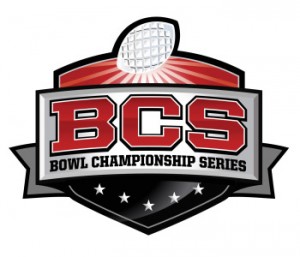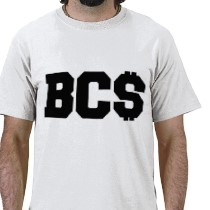As you might have just heard, the Fiesta Bowl will be allowed to remain part of the Bowl Championship Series, though it must pay a $1 million fine (which sounds like a lot of money, but really isn’t in the grand spectrum when you consider their annual earnings history) for apparent illegal campaign contributions and inappropriate spending.
The BCS presidential oversight committee made the “slap-on-the-wrist” style decision Wednesday, which allows the Fiesta Bowl to continue to be part of the system for deciding a college football national champion. The NCAA also added that they will increase supervision of the bowl, which means…probably not much, except they’re now on double secret probation.
It was the Fiesta Bowl’s malfeasance and corruption that has brought more attention to the cartel that is the BCS. The Department of Justice is currently investigating the OPEC of big money sports, and NCAA President Mark Emmert and BCS Director Bill Hancock are doing little more than playing the denial and ignorance game.
By Paul M. Banks
The Fiesta Bowl’s egregious offenses have called attention to the horrible corruption of the BCS. And now the Feds are investigating the cartel’s possible involvement in anti-trust behavior. This is very much about economics and markets, and less about football. So this article continues first and foremost in the vein of “the dismal science” not the gridiron.
You don’t need a MBA to understand this, but since I am one, I’m actually really excited about this story and hope to convey that ebullience over to you the reader in breaking this down.
A must read comes from this ESPN article by Andy Schwarz, who drafted the economic arguments in a letter recently sent to the U.S. Department of Justice requesting an antitrust investigation into college football’s Bowl Championship Series, which the DOJ cited in recent inquiries to the NCAA questioning the lack of a playoff system.
Schwartz writes:
While fans know the BCS is about football games and telecasts and the people who watch them, the DOJ is just thinking about products and consumers. For any industry, the DOJ is concerned whether collusion (in this case among teams, conferences and bowls) is preventing a market from functioning competitively, such that the colluders can exclude new competitors (here, a postseason playoff) from entering the market, entrenching less desirable products and raising prices to the detriment of consumers and the nation’s economy.
Yes, the evidence is there for the BCS to be found guilty of colluding (or conspiring if you will) to keep illegal barriers to entry in place that discourage any competition and maintain the status quo. We all know America is all about “free markets” and the idea of economic “pure competition.” Both ideals are obviously fallacies, probably in theory as well in practice. (but that’s a whole another article, the U.S. economy is anything but a “free market).
Still there are markets that are much more restricted than others, and when you consider the fact that the bowls themselves, not the NCAA, regulates the system, then change is imminent. When you have the inmates running the asylum, and no true “regulators” (where is Emilio Estevez and Charlie Sheen, or better yet Nate Dogg and Warren G.) in place, it opens the door for the Federales to step in.
Quoting Schwarz again:
For example, while a sports fan knows the BCS National Championship Game is not what we want, the Championship Game itself is probably not an antitrust violation. Instead, 20 colleagues and I argued to the DOJ that what likely is an antitrust violation are the collusive steps the BCS has taken to insulate its weak championship game from competition from a better alternative.The antitrust laws favor cooperation among competitors only if it results in new products that would otherwise not exist
We know that what’s standing in the way of an actual playoff is money-related. But it could be actual illegality of action. The BCS bowls are functioning as an oligopoly right now, and trust-busting in the vein of Standard Oil towards the turn of the last century is precisely what’s needed to bring us an actual playoff system.
And it could very well happen, I’ll highlight how in the next piece.

